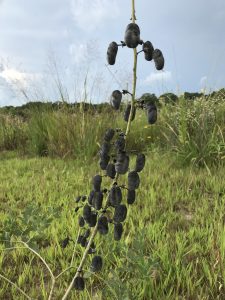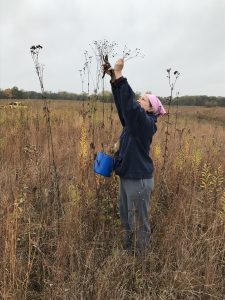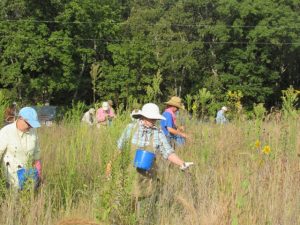Why Seeds? Why now?
By Martin Kemper, retired IDNR Heritage Biologist
If you read; if you listen; if you simply look out your window as you travel about you will know… know that we are living in what historians are beginning to refer to as the 6th great extinction event.
The fifth such event was the result of an asteroid hitting earth near the Yucatan peninsula some 60 million years ago. That impact produced a planetary “nuclear winter” that eliminated over ½ of the species on earth.
The most knowledgeable among us now predict a similar outcome for earth’s plant and animal species by 2100 – one lifespan. UNLESS…. (and here is the good news), unless we wake up to the issue and take action.
One key to conserving our living partners on this planet is saving the planet’s plant life and the places those plants live. Seeing as there is already something of a deficit of places, that prescription also includes recreating some of the places already lost, or so impacted they no longer function to support nature.
And here is where seeds enter the picture in a very big way. In many cases, there is no practical way to restore our natural communities – the places needed by wildlife (and indeed we all), without planting and nurturing the seeds of the plants that form their foundation. “Build it and they will come” is now a popular saying. In nature, our building blocks are most importantly – seeds.

Doug Tallamy in his very popular book “ Bringing Nature Home”, tells us that on average, every plant species supports 6 invertebrates – bees, beetles, butterflies and the like that make our planet and its flowering plants work – species that pollinate our plants, feed our wildlife, and recycle nature’s nutrients.
And they support the entire animal kingdom on terra firma – as one of my not so biologically inclined friends used to say – all of the tweety things, the floaty things, the slithery things, and the cuddly things.
Seed plants are the foundation of every natural community on dry land. They power every aspect of native ecosystems. Their health is the health of our environment. It follows that insuring the future of every plant as a functional part of their natural habitat is essential.
Acquiring and propagating native plants in their natural assemblages has become increasingly important to accomplish that end – one that Clifftop, among many like-minded conservation organizations, is taking to heart.

Happily, while the work of collecting, planting, and nurturing can be challenging, the benefits are substantial. I will quickly mention 3. Those with experience could expand this list many-fold.
1) It simply is not possible to join the world of seed collection and collectors without learning identities of the plants that surround us. There are few more rewarding personal endeavors than converting what was once part of the “green blur” into known and (if collecting seed) intimate friends.
It makes absolutely no difference where or when you start. You are never too young or too old to lose the thrill of new found knowledge of nature. Acquiring a good book or two is one road to get started. Newcomb’s Wildflowers or the Peterson Guide to Wildflowers are some excellent references. Another avenue – just hang around with the crowd at Clifftop… somebody will know what that “wavy” or “bloomy” thing is.

2) In the process of learning, being with like-minded individuals in a mutual endeavor of urgent need is an ancillary reward. The fruits of one’s labor extend to the relationships built. My own experience is that the people one encounters in the fun but serious labor of ecological restoration, earth care, or creation stewardship, however you wish to view it, are acquaintances and friendships that are valued for a lifetime.
3) As rewarding as acquiring knowledge can be, as rewarding as developing valuable friendships is, knowing the point of one’s labors is the restoration of land to health can be a surpassing experience. The conservation and improvement of “our common home” (as Pope Francis simply put it), the practice of self-restraint and even sacrifice of time, talent, and treasure in the interest of others including future generations, those are rewards that are worth seeking. “Priceless” is no cliché.
CLIFFTOP, a local nonprofit organization, is focused on preserving and protecting area blufflands.
A version of this article appeared in the August 16, 2019 edition of the Monroe County Independent.
© 2019 all content rights reserved Clifftop NFP.
Comments are currently closed.
